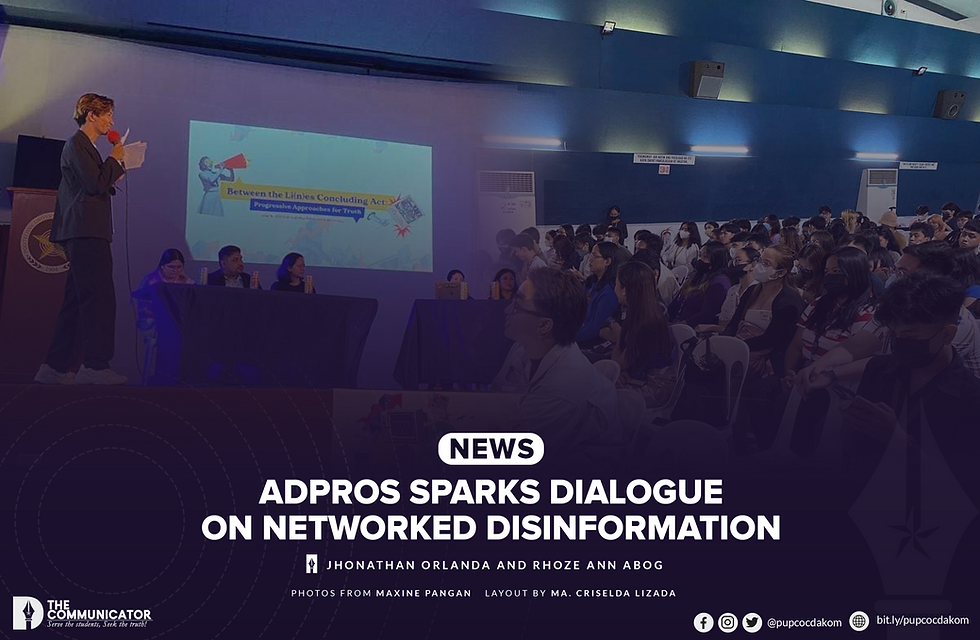NEWS | ADPROS sparks dialogue on networked disinformation
- The Communicator
- Jun 19, 2023
- 3 min read
The PUP Advertising and Public Relations Organization of Students (ADPROS) conducted an event titled, "Between the Li(n)es Concluding Act: Progressive Approaches for Truth" held at Claro M. Recto Hall in the PUP Main Building on June 14, which shed light on the roles and efforts of ADPR professionals and various sectors in dismantling networked disinformation.

This final leg of ADPROS' advocacy plan featured a round-table discussion followed by a workshop titled "#DigiTalino: Amplifying Digital Literacy for Disinformation-Free Communication," led by the Break the Fake Movement PH.
The event commenced with remarks from Senator Risa Hontiveros, who emphasized the crucial role of truth in building credibility and leading society towards justice. She encouraged participants to choose truth over power and highlighted the importance of speaking truth to power for the betterment of future generations.
𝗔𝗱𝗱𝗿𝗲𝘀𝘀𝗶𝗻𝗴 𝗻𝗲𝘁𝘄𝗼𝗿𝗸𝗲𝗱 𝗱𝗶𝘀𝗶𝗻𝗳𝗼𝗿𝗺𝗮𝘁𝗶𝗼𝗻 𝗮𝗻𝗱 𝗮𝗱𝘃𝗼𝗰𝗮𝘁𝗶𝗻𝗴 𝗳𝗼𝗿 𝘁𝗿𝘂𝘁𝗵
The conference started as esteemed guest panelists took part in a roundtable discussion, offering insights and strategies to advance the fight against networked disinformation. Each speaker addressed pertinent questions, focusing on the challenges faced and opportunities available for their respective sectors.
Nikki Golez, creative director at Propel Manila, debunked the assumption that advertising agencies are the root source of disinformation. She emphasized the presence of checks and balances within the advertising world, ensuring that disinformation is prevented through standard processes and councils.
Meanwhile, Evident Communication's Associate Director for Advocacy Communications, Mef Marzan, highlighted the vital role of PR agencies in countering the spread of disinformation.
“The spread of disinformation happens on a particular platform. We in the PR and ad agency spaces, also have access to that through our clients. So if we can push forward better strategies in order to respond to these disinformation campaigns within those platforms, then it's our responsibility to develop effective strategies in those particular spaces,” Marzan said.
Meanwhile, Atty. Grace Salonga, the Executive Director of the Movement Against Disinformation (MAD), shared the multi-pronged approach employed by civil society organizations to counter networked disinformation and advocated for the passage of legislation to strengthen the fight against disinformation.
Laying out strategies on how non-governmental organizations (NGOs) respond to the problem, Paolo Ordonio of Break the Fake Movement PH, pointed up the importance of collaboration between local organizations and other sectors in tackling disinformation and the need for accessible language, empathy, and active participation in educating the public.
On the other hand, Nikki Estella of the Youth-led Network for the Right of Information (YNFORM) also shared their strategic plans, such as mobilizing youth engagement, developing channels and tools for truth-seeking, and fostering policy frameworks for youth access to information and freedom of expression.
Addressing disinformation through the lens of journalism, the National Coordinator of Altermidya, Ms. Avon Ang, highlighted the need for accuracy and context in journalism to counter false narratives.
While Lheonel Sanchez, Editor-in-Chief of The Communicator, focused on how student publications can raise student participation in combating networked disinformation on campuses.
𝗥𝗼𝗮𝗱 𝘁𝗼 𝗲𝗳𝗳𝗲𝗰𝘁𝗶𝘃𝗲𝗹𝘆 𝗯𝗲𝗰𝗼𝗺𝗶𝗻𝗴 𝗱𝗶𝗴𝗶𝘁𝗮𝗹 𝗹𝗶𝘁𝗲𝗿𝗮𝘁𝗲
To complete the application stage of the final phase of the advocacy campaign, Break the Fake Movement PH conducts a discussion and workshop entitled #DigiTalino: Amplifying Digital Literacy for Disinformation-Free Communication that aims to enhance the digital literacy skills of ADPR students and practitioners as they are equipped with the tools they need to fight misinformation and disinformation.
The regional initiative #DigiTalino of the ASEAN Foundation and Google.org seeks to combat false information and disinformation by teaching young people, educators, parents, community leaders, and government officials how to use digital literacy in partnership with their local implementing partners.
The discussion and workshop were facilitated by Joseph S. Cadeliña, MHSS, RN, and Master Trainer of the Break the Fake Movement under the ASEAN Digital Literacy Program. Mr. Cadeliña discusses four lessons: the power of information, disinformation today, knowing your biases, and how to be #DigiTalino.
The event concluded with insightful words from Prof. Earl Jaynus Guzman and Prof. Xiao Chua, encouraging the participants to fight against disinformation.
Article: Jhonathan Orlanda and Rhoze Ann Abog
Graphics: Ma. Criselda Lizada



Comments